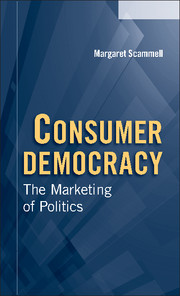Book contents
- Frontmatter
- Dedication
- Contents
- List of Tables, Figures, and Images
- Acknowledgments
- Preface: The U.S. Presidential Election of 2012
- Introduction
- 1 Political Marketing
- 2 Political Marketers
- 3 Political Brands
- 4 George W. Bush
- 5 Campaigning Effects
- 6 Citizen Consumers, Political Marketing, and Democracy
- Conclusion
- References
- Index
5 - Campaigning Effects
How Do They Know What Works?
Published online by Cambridge University Press: 05 June 2014
- Frontmatter
- Dedication
- Contents
- List of Tables, Figures, and Images
- Acknowledgments
- Preface: The U.S. Presidential Election of 2012
- Introduction
- 1 Political Marketing
- 2 Political Marketers
- 3 Political Brands
- 4 George W. Bush
- 5 Campaigning Effects
- 6 Citizen Consumers, Political Marketing, and Democracy
- Conclusion
- References
- Index
Summary
This chapter addresses three questions: What is a good campaign? How do professional campaigners deal with the problem of evidence? What is the independent verification from social science that campaigns matter at all?
What Is a Good Campaign?
One can trawl through the vast expanse of trade literature and speak with dozens of consultants and arrive at the same answer: winning is the most important criterion of a good campaign. Winning is the essential condition even if campaigners recognize that it is not sufficient. As U.S. consultant Peter Fenn (2003: 79) notes,
We have all seen terrible campaigns that have, nevertheless, emerged victorious and we have seen great campaigns, great polling, great strategy and research, great media that have come up short. But few people talk about losing campaigns or mistakes, except to complain or put the blame on someone other than themselves. Even fewer people dare to write about a loss.
Fenn’s article is one of the few in the twenty-six-year history of Campaigns & Elections that does dare to write about defeat. However, even he talks within the predominant frame: losing campaigns provide valuable lessons but primarily as case studies of mistakes. It is exceptional for losers to provide models of good campaigning, Howard Dean’s Internet-fueled primary race in 2004 being one of the rare examples. There are at least two good reasons why this is so. First, in the competitive world of political consultancy, management of a losing campaign is a dubious recommendation to future clients, no matter how smart the strategy or disciplined the organization. Second is the problem of evidence. It is notoriously difficult to isolate and measure with any precision the impact of particular aspects of organization, strategy, and tactics in any given election. Thus campaigners must provide credible explanations of how their actions may influence election results; and since there are only two possible results, win or lose, consultants naturally link their work with winning.
- Type
- Chapter
- Information
- Consumer DemocracyThe Marketing of Politics, pp. 112 - 137Publisher: Cambridge University PressPrint publication year: 2014



